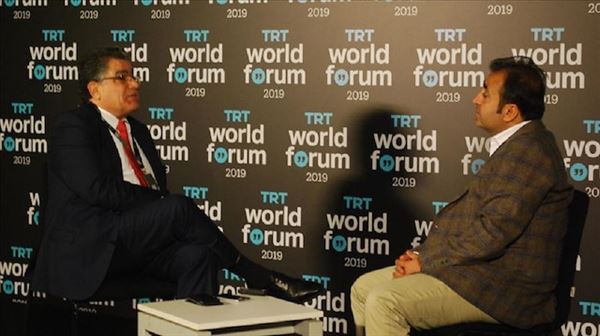Turkey's safe zone in northern Syria will motivate significant number of displaced locals to return to their country because Ankara is helping them wi
Turkey’s safe zone in northern Syria will motivate significant number of displaced locals to return to their country because Ankara is helping them with everything they need for an early recovery, said a leader of the Syrian community.
On Oct. 9, Turkey launched a cross-border military operation to eliminate the terrorist threat east of the Euphrates River and aid in the safe return of Syrian refugees.
Ankara agreed with Washington on Oct. 17 to pause Operation Peace Spring for five days to allow YPG/PKK terrorists to withdraw from the planned safe zone under U.S. supervision.
Then on Tuesday, Turkish President Recep Tayyip Erdoğan and his Russian counterpart Vladimir Putin signed a “historic” deal in Russia’s Black Sea resort town of Sochi to enlarge the long-demanded safe zone and push YPG/PKK terrorists 30 kilometers (19 miles) south of Turkey’s border within 150 hours.
Ghassan Hitto, one of the early leaders of the Syrian opposition and CEO of the Syrian Forum, a humanitarian non-governmental organization based in Istanbul, shared his thoughts, hopes and concerns regarding the future of Syria with Anadolu Agency in an exclusive interview.
“I use Turkish statistics for the Euphrates Shield and Olive Branch operations, and since then, about 350,000 Syrians have returned to Syria. Because when Turkey comes in — this is a fact — they invest somewhat in the infrastructure in terms of roads, communications, and these are all required tools for an early recovery,” Hitto said.
He said when a country like Turkey takes such “initial steps in terms of creating some sort of civilization,” Syrians will return as a “natural result.”
“So I do expect a significant number of Syrians to return, assuming the safe zone operation is successful.”
Hitto, who also co-founded the Washington-based Omran Center for Strategic Studies, a think tank on Syrian issues, said the return will be “immediately from Turkey” but will be followed from Europe.
Assad responsible for all Syrian sufferings
Hitto, however, voiced his concern over the Syrian constitutional committee, which he thinks might eventually “legitimize” regime leader Bashar al-Assad if Syrians cannot get what they want at the negotiating table.
He emphasized that the Syrian regime and Assad in particular are the “root cause” of all the problems and suffering in Syria.
“When Assad is gone, many solutions will open up,” he said, adding children in Syria are no longer taught slogans like “Syria for all Syrians” but “Assad’s Syria.”
He went on to say that Assad believes all Syrians are his own “slaves” and urged the international community to remember his track record during the civil war in creating the “worst humanitarian crisis of the 21st Century” and then decide if he is the president they want to see in Syria.
“Look at the numbers closely. Half of the population is displaced. 5.3 million Syrians have become refugees. 3.6 million are in Turkey, right? Another 6.5 million are displaced inside Syria. These are real people. 11 million Syrians are under the poverty line. One million Syrians gave up their lives, were maimed or are in prisons,” he said.
“Remove Assad from the picture and life is good. We will rebuild and we will accept other creative solutions.”
‘As a Syrian Kurd, I say PYD/YPG are terrorists’
Summarizing the feelings of millions of Kurds who oppose the PKK and its offshoots in Syria, Iraq and Iran, Hitto supported Turkey’s military operation against the terror group and called them “terrorists” who do not represent the Kurds.
“I would like to differentiate between two things, and this differentiation in my mind is very clear: the PYD and the YPG, the PKK, for that matter — they don’t represent Kurdish people at all,” Hitto said.
“I am a Kurd myself. My mother is Kurdish, my father is Kurdish, and I can tell you, never in the past I belonged or we thought that this type of school or ideology represented the Kurds, and I’m speaking an absolute. If they represent any, they represent a minority,” he added.
“Their danger is no less than ISIS.”
